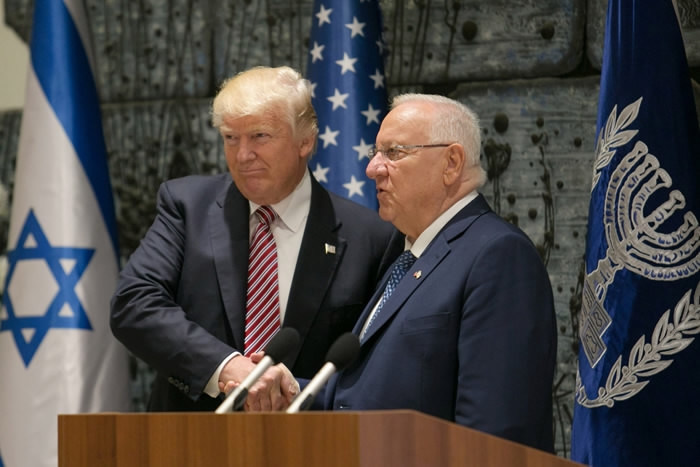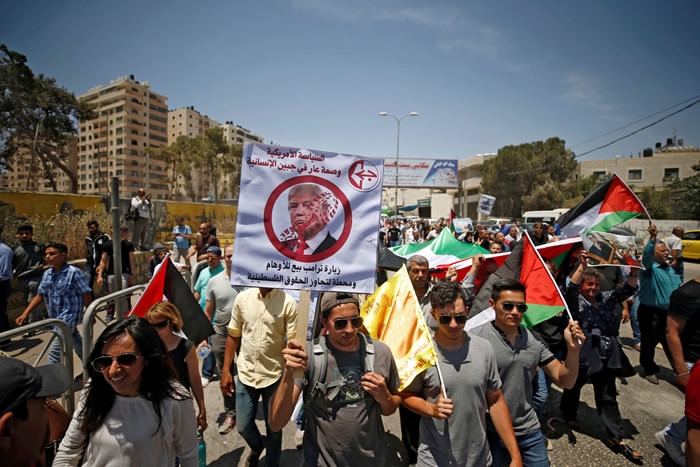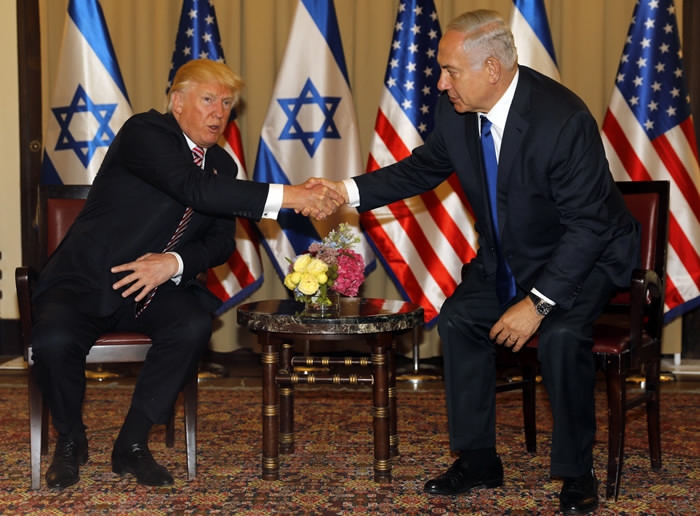US President Donald Trump said Israel and Arab countries in the Middle East share a common enemy – Iran, calling it a "state sponsor of terrorism" that must never be allowed to have nuclear weapons.
"The United States and Israel can declare with one voice that Iran must never be allowed to possess a nuclear weapon, never, ever! And must cease its deadly funding, training and equipping of terrorists and militias," Trump said in a speech at the official residence of Israeli President Reuven Rivlin in Jerusalem on Monday, after flying in from Saudi Arabia earlier in the day.

US President Donald Trump (L) shakes hands with Israeli President Reuven Rivlin in Jerusalem on May 22, 2017. /Reuters Photo
Tehran's support for Syrian President Bashar al-Assad in Syria's civil war, Houthi militants in Yemen and Hezbollah in Lebanon has helped destabilize the Middle East, he added.
The US president, on the second leg of his first overseas trip since taking office, told Rivlin that there was a strong consensus on Tehran's threat among countries worldwide, including many Muslim-majority nations.
"There is a growing realization among your Arab neighbors that they have common cause with you in the threat posed by Iran," Trump said, stressing that many leaders of Muslim countries had pledged to join the fight against terrorism during their conversations in Saudi Arabia.

A Palestinian demonstrator holds an anti-US President Donald Trump poster during a protest in support of Palestinian prisoners on hunger strike in Israeli jails near the West Bank city of Ramallah on May 22, 2017. /Reuters Photo
Trump also paid a visit to the Western Wall, the holiest place where Jews are permitted to pray. Wearing a black skullcap, he became the first sitting US president to visit the site in the disputed city of Jerusalem.
The status of Jerusalem, occupied by Israel in 1967 along with the West Bank, is one of the most difficult issues in Israeli-Palestinian peace talks.
Palestinians and Israelis are locked in a bitter feud over sovereignty of the city, with both sides eyeing it as their capital.
Trump later held talks with Israeli Prime Minister Benjamin Netanyahu in Jerusalem and is scheduled to meet Palestinian President Mahmud Abbas in Bethlehem on Tuesday, as part of his efforts to revive the stalled peace process between Israel and Palestine.

US President Donald Trump (L) shakes hand with Israeli Prime Minister Benjamin Netanyahu during their meeting at the King David Hotel in Jerusalem on May 22, 2017. /Reuters Photo
Rouhani: Iran ready to help
Also on Monday, Iran's re-elected President Hassan Rouhani dismissed Trump's Sunday summit with Arab leaders in Saudi Arabia as "a show with no practical or political value," while offering "interaction" with the world "on the basis of mutual respect and shared interests."
"The gathering in Saudi Arabia was just a show with no practical or political value of any kind," Rouhani said at a press conference in Tehran.
Commenting on the 110-billion-US-dollar arms deals between Washington and Riyadh, he said: "You can't solve terrorism just by giving your people's money to a superpower."
Rouhani stressed that stability could not be achieved in the Middle East without Tehran's help, adding that his country was ready for interaction with its neighbors to restore peace and stability in the region.
The 68-year-old president, a moderate and reformist who oversaw Iran's nuclear deal with world powers in 2015, beat his hardliner rival Ebrahim Raisi in a landslide victory last Friday. Rouhani indicated that the election result had been Iran's message to the world for more engagement.
"We wanted to tell the world that on the basis of mutual respect and shared interests, we are too ready to have interaction," he said.
Related stories:
Trump: Iran must never allowed to have nuclear weapons









